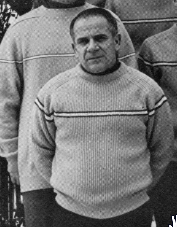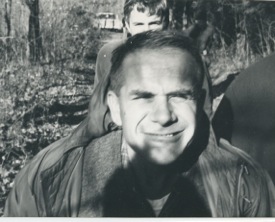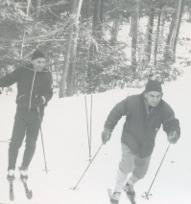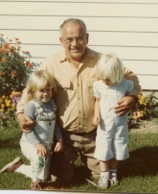 Editor’s note: we’re lucky to have two tributes to Coach Ralph Townsend from two different perspectives. Bob Cricenti was a mainstay of the Williams Outing Club and held responsibility for running the ski events of our Winter Carnival. Ted Ragsdale competed on the Williams Ski Team and provides his recollections of that experience. Ted has also contributed pictures from his own collection; find those at the end of his tribute.
Editor’s note: we’re lucky to have two tributes to Coach Ralph Townsend from two different perspectives. Bob Cricenti was a mainstay of the Williams Outing Club and held responsibility for running the ski events of our Winter Carnival. Ted Ragsdale competed on the Williams Ski Team and provides his recollections of that experience. Ted has also contributed pictures from his own collection; find those at the end of his tribute.
Bob Cricenti:
My memories of Ralph Townsend started before I came to Williams. Just before Orientation week my dad tried to meet Ralph at his office in Jesup Hall. My dad knew Ralph from days at the University of New Hampshire in the 40’s before the war, and we were all New Hampshire folk and that’s a small place. We didn’t get together that day, but I made sure to get in touch with him as soon as possible to extend my dad’s greetings. Twinkling eyes and all were what he brought to my first Outing Club meeting and soon I was impressed with this man. His ideas of how to interact with the outdoors made sense.
Later on I got heavily involved with the ski meet at Winter Carnival. I started out as a gatekeeper and moved up the ladder of responsibility to Assistant Chair and then Chairman of Winter Carnival for my last two years. At this point my admiration for Ralph reached great heights. Beside coaching his ski team, in 1965 he was obliged to negotiate with Jiminy Peak and move the entire event there when insufficient snow forced the meet off of our native slopes on Berlin Mountain. He accomplished this almost effortlessly by allocating responsibility for all the parts to various persons and then allowing them to work by themselves. The next two years also had snow issues but we managed to run the meet at Berlin Mountain. No downhill though. Slalom and Giant Slalom at the top of the mountain. I left Williams never having seen a competitive race on that beautiful headwall.
In 1968 Coach Ralph showed his class when high winds forced cancellation of the jumping after Williams had valiantly skied into first place by placing high in the slalom event, thus determining that the meet would have no champion. Coach Townsend declared that when teams expected to have four events and only three were run, there should be no official winner. How many “home town guys” would act like that?
I learned so much about life and how to comport myself from knowing Ralph Townsend. He was an Olympian who never made that a big deal to us. To us he made a big deal of showing us the beauty of the great outdoors. He taught us how to live in the present.
Ted Ragsdale:
Williams has had many great teachers, but far fewer great educators. Ralph Townsend, or “Coachie” as he was reverently called, was a stand out in that select group. Coachie, at 5’2”, was diminutive in stature, but his heart, humor and humanity were those of a giant. He motivated a quarter century of William’s skiers and outdoor enthusiasts through example, homespun wisdom and old fashioned empathy.
As a coach, he always knew that the purpose was always to encourage each person to discover their best attributes and to learn how to bring them together with their teammates to become something greater than the sum of the parts. He was able to build self-esteem and commonweal in a way that mindless coddling and new age individual relativism never could or ever will. He realized that diversity is something that exists in every group no matter how homogeneous they may or may not at first appear.
Keep individuality, keep diversity, mold it into a team and let them win as a team.
Ralph Townsend graduated from Lebanon High School in New Hampshire and then attended the University of New Hampshire (UNH), where he was in Army ROTC. He served in the 10th Mountain Division during World War II, as a squad leader in the third platoon of K Company, 8th Regiment. In March 1945, K Company led the attack on the enemy’s entrenched positions on the steep hill of Cimon della Piella, Italy. During this encounter Ralph suffered serious wounds, for which he received the Purple Heart. At the time, he was told by the doctors that he would not be able to ski competitively again. Despite that warning, Ralph did ski again and he skied well. He returned to UNH where he won US cross-country ski titles in 1947 and 1949. He graduated from UNH in 1949 and in 1953 earned a masters degree in physical education.
Ralph began his career at Williams in 1950 as a physical education professor and head ski coach as well as being an assistant coach for both football and lacrosse. He founded the Williams Outing Club. He designed and helped build the Berlin Mountain Ski Area and jump, and also the Savoy XC course. He worked nationally in ski administration and became director of the US Eastern Amateur Ski Association in 1951, President of the Eastern Intercollegiate Ski Association from 1958 to 1960, and secretary of the NCAA Ski Rules Committee in 1962. In his honor, in 1959 Williams began awarding the Ralph J. Townsend Ski Trophy to the best men’s skier. Ralph was inducted into the US Ski Hall of Fame in 1975 and was also inducted into the Army ROTC Hall of Fame. He had a truly remarkable career.
I will never forget my first ski team trip in January 1965. We were piled into the team’s Chevy station wagon with its porcupine ski rack piled 6 skis high with 240cc jumping skis, Splitkein wooden XC skis and Dynastar Alpine skis. Coachie drove across the glare ice and frost heaves of New England’s back roads with his Swix Nordic hat, lower edge rolled up, perched on top of his large head that barely reached over the top of the steering wheel. He picked his teeth with a wooden match as he drifted around the corners telling tales peppered with New England humor. Just out of Lebanon the other car, driven by one of the senior team members plowed into a snow drift. “Jumpin butterballs, what a difrugalty”, he muttered. Then looking out across the field he said, “Jesum crimus this is where old “Albert Muncy” stacked it up.”
He then related how late one New Years Eve he and “Unc”, his brother Paul, were driving by and saw headlights in the middle of the field. They stopped, got out and followed the tire tracks through a fence and out to where they found Muncy in his car that was high centered on the floor beams over the basement of a demolished house. The lights were on, the motor running, and the tires were still spinning. ‘By Jesus’ if old Albert the town drunk wasn’t still inside the car, hands on the wheel and eyes focused on what he thought was the road in front of him. Coachie and Unc walked around towards the front of the car. They waved and jumped up and down until old Albert finally noticed them. He looked up with a start, then waved back and began down shifting to slow the car down. Finally, with the car idling, he set the emergency brake, opened the door, stepped out and plummeted 8 feet into the snow in the basement. Coachie and Unc laughed like the Click and Clak on NPR’s Cartalk.
It was after dark by the time we made it to the Tamarack Inn and Tennis Camp in Franconia that was run by their old 10th Mountain friend who later was to be Bodi Miller’s grandfather. Within minutes Coachie had appeared wearing a full bear’s head and pelt and roaring ferociously scaring everyone in the room. Early the next morning, we were off to Sel Hannah’s potato patch for the 15k XC. I will always remember the smell of pine tar and Klister on the wooden bases as Coachie regaled St Lawrence’s Bob Axtell and Middlebury’s Bobo Sheehan with joke about Al Merrill of the big Green, all the while hiding his secret kicker waxes from their probing eyes. Once the races started, he sent us off with admonitions of “do good” and “have fun”. We were “dubbahdoos” if we broke a ski. The jumpers had to remember the second “zik” as they leaned forward over their skis and warning the “strictly alpine” skiers had to watch out for the “banana” hairpin gates Since those were the Rikert years, and his results alone usually kept us in the hunt in the Carnivals, life was good.
For every ski team member there were a legion of others students that Coachie introduced to New England and the great outdoors, with the same energy and warm enthusiasm, through the Williams Outing Club.
I last saw Coachie at our 15th reunion in 1983, five years before his death at age 66. He and his wife Harriet were welcoming as always. and enclose a picture with my two daughters.



